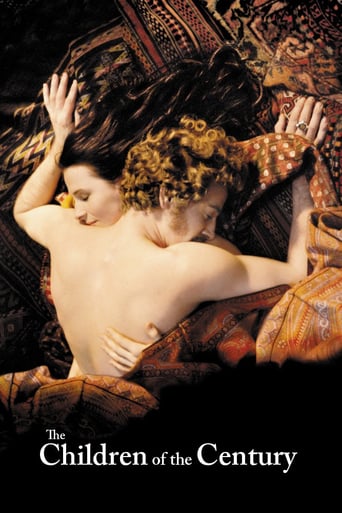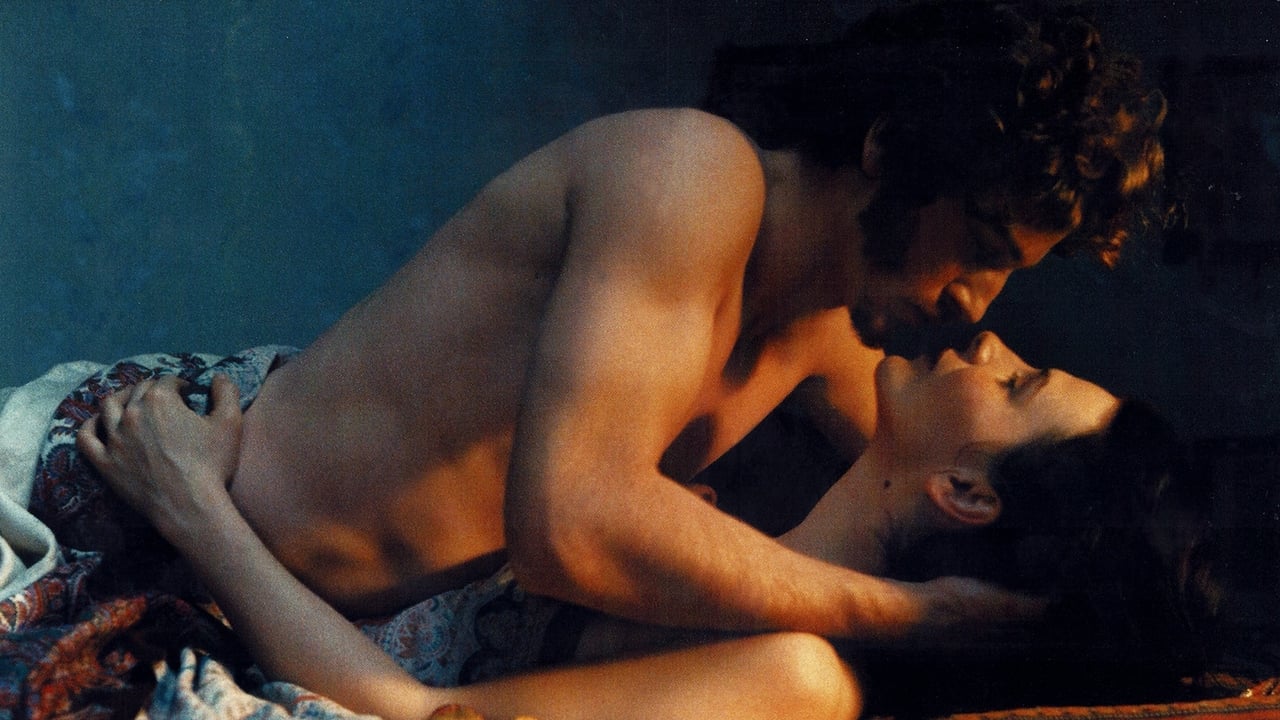MartinHafer
While this movie wasn't exactly faithful to the lives of George Sand and Alfred de Musset, it is difficult to imagine the movie being technically better. They really got the period represented well and the cinematography is lovely. The problem, then, is I doubt if this movie should have been made in the first place. I found BOTH real-life characters to be among the most annoying and pointless characters I have ever watched. It's hard to care about people when they are like Musset--selfish, boorish and showing all the signs of a Borderline Personality Disorder. And, likewise, it's hard to care about a woman so fundamentally screwed up that she MUST have this worthless jerk in her life! Now that I think about it, it's like taking a couple who are featured on the Jerry Springer Show, giving them gobs of money and sending them back to the 1830s to live. It's just really hard to care about spoiled, rich idiots. Stop whining about your lives--you pampered fools--get real jobs and stop spending your life in search of hookers and drugs--or trying to win back this guy who seems to be trying to win the "pimp of the year" award! Frankly, after the movie was over, I just wanted them all to go to #$*@!! Next time, spend the time and effort and talent involved on doing a biography on someone who is interesting and not grating like these two knuckleheads. Their literature may be great (though after seeing this film, I'll never try reading it), but as human beings they were both sadly lacking.PS--Although in the movie Alfred de Musset and George Sand broke up when it appeared to be around 1834 and he seemed to die unknown to the French public a year or so later (or at least a short time later), he did not die until about 20 years later and had been pretty prolific with his writing after their breakup. So much for presenting the story faithfully.PPS--Don't let your kids see this boring movie, as it is very graphic. Alfred de Musset goes from brothel to brothel boinking everything that breathes. Gee, I could sure see why Sand wanted him for a lover!PPPS (wow)--Don't feel too sorry for Sand. Despite the rather monogamous image we see in the film, she had a long string of affairs with very famous men. By the time the real Musset died, she'd slept with more than her share of men (and, some say women as well--but that's open to speculation).
tatyanna_patten-1
If Romanticism, as a movement, can be defined as an "infinite longing" which combines passion and erotic tension with death, despair, and the cycles of nature, then Kurys film portrayal is aptly named and her protagonists--Alfred de Musset and Georges Sand--are indeed children of their century.The key to understanding the point of this film is to think of it as a painting. It does not give you an insider's view of the relationship between these two literary giants; it does not break down their psychology; and you do not even understand why you, as an audience member, should like either of them. Yet their obsessive love was a monument for the first major artistic movement of the 19th century. Kurys paints them as Delacroix would--in all their lurid color, capturing the details of high emotion without explaining a thing. As painting on film, Les Enfants succeeds as wildly as any Romantic dreamscape and, thus, captures the mood of that era and the sentiment which spawned it more perfectly than 1,000 words on the subject.
ljp-2
I'm a great admirer of George Sand's works, so I was curious about this film, and have been ever since I heard that it came out in France in 1999. I finally got a chance to see it two weeks ago in New York. Diane Kurys' film is well-acted and beautifully shot. Unfortunately, viewers won't be much enlightened about Sand or Musset as writers by watching it. Nor is it a convincing love story. Both of these faults are mostly due to a mediocre script.The basic outline of the facts of Sand's relationship with Musset are there, but any sense of *why* they had such a fatal obsession with each other is lacking. Lots of inane dialogue about love isn't enough! The two are barely together before they're fighting, and Musset is such an unpleasant, selfish, manipulative and immature fellow (a characterization that's apparently pretty true to the facts) that Sand's devotion to him is hard to fathom. Surprisingly, from a filmmaker with a feminist slant, you learn very little about Sand's beliefs as a woman or an artist. She seems like a sane person, though, and a hard-working writer (and that is historically accurate), but there's no depth, in spite of all that the lovely, talented Juliet Binoche can do. The character as written simply isn't interesting, and that's sad, because the real life George Sand was a fascinating woman.
The film's portrait of the Romantic era and its writers isn't much better. Yes, I suppose with all the bad behavior and opium-gulping, Musset and some others were like the childish, spoiled rock stars of today (which may have been the filmmaker's point), but there's no sense of what their work was like. When Sand and Musset talk about their writing and its meaning, they sound like rank amateurs. The one thing you learn about Sand's novel *Lelia* from the film is that it was about female frigidity and how few men are capable of arousing a woman. (Naturally, Musset soon cures Sand of her "frigidity." Hoo-boy). In reality, *Lelia* is a complex attempt to address many philosophical issues of the age and a struggle to find the meaning of existence, with or without God, but that doesn't make good cinema, I guess. It's easier to suppose that women are always going to write about sex, rather than to admit that they have any ideas of their own.
If you want real insight, you'd be far better off reading Sand's works (something like her most magnificent short story, "The Marquise," for starters). Or how about calling a moratorium on films about Sand's love life and actually bringing one of her works to the screen? That would be a real tribute.
Ian Turner
At the beginning of the film Alfred when commenting on a play by George observes that the lead character must die, with in a relatively short time i was having similar thoughts about Alfred. This may or may not be an historically accurate film but the story wasn't suitable for a film as despite being about the love affair between two people it managed to be remarkably lacking in passion (Remains of the Day being far more passionate despite being about two characters repressing it for the whole film). Neither character could be deemed to be sympathetic as Alfred was a selfish child and George was just annoying with her insistance on returning to the man who loved to strangle her at regular intervals.


 AD
AD


